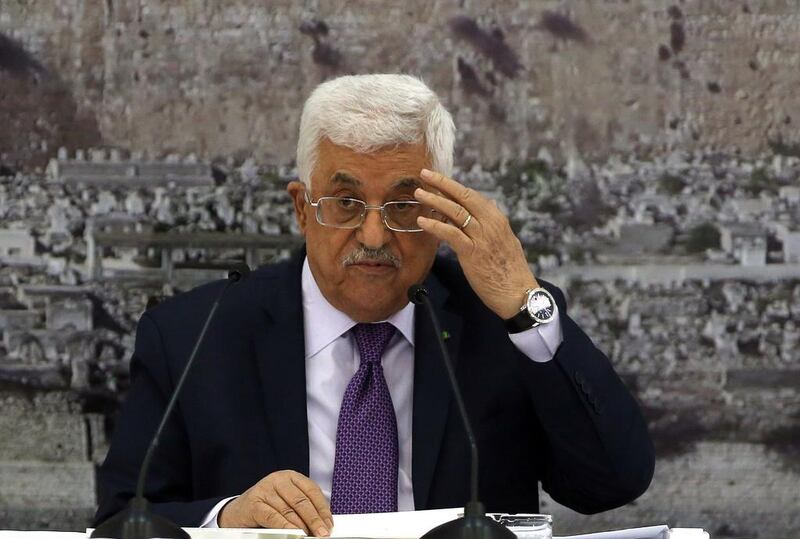New York // There is little hope that the UN Security Council will vote in favour of a Palestinian draft resolution that sets a deadline for Israeli withdrawal from illegally occupied land.
But the new diplomatic opening may ease some of the pressure that has been mounting on Palestinian president Mahmoud Abbas.
The western-backed leader’s decade in power has failed to put the Palestinians decisively on the road to statehood and he is under intense domestic pressure to take bolder steps after the collapse of US-led negotiations with Israel earlier this year.
Thousands of Fatah supporters of Mr Abbas’s party rival, Mohammed Dahlan, protested in Gaza on Thursday, accusing Palestinian Authority leader of corruption and acquiescence to Israel.
However, the submission of the resolution on Wednesday hopes to achieve a number of short-term goals while setting the stage for negotiations over a softer version that could still trigger new talks.
The draft resolution, backed by Arab ambassadors at the United Nations and submitted by non-permanent council member Jordan, keeps the peace process issue centre stage amid the more pressing troubles plaguing the Middle East, and raises pressure for resuming talks at a time of relatively favourable conditions for the Palestinians.
While Palestinian officials initially insisted they would seek a vote on their resolution immediately, the ambassador to the UN, Riyad Mansour, made clear yesterday that he welcomed negotiations to make the draft amenable to the US and not draw a veto.
Washington also insists that any action at the UN be postponed until after Israeli elections in March. In the meantime, the introduction of the draft ensures high-level negotiations at least until then.
“We will continue negotiating with all of them, and the Americans if they are ready and willing, so that perhaps we can succeed in having something adopted by the Security Council,” Mr Mansour said.
According to chief Palestinian negotiator Saeb Erekat, US secretary of state John Kerry said that the US would veto any resolution that set a deadline for withdrawal from the Occupied Territories.
France, working with British and German diplomats, has drafted a parallel resolution that calls only for a deadline for negotiations, and continuing talks may hinge on merging the two drafts.
Some of the French elements were included in the draft submitted by the Palestinians, but the deadline for withdrawal remained.
Frustrated European countries have taken up the mantle from the US of trying to shepherd talks.
The Arab-backed Palestinian draft resolution sets a 12-month deadline for a “just, lasting and comprehensive peaceful solution that brings an end to the Israeli occupation since 1967”, the recognition of the state of Palestine with Jerusalem as a shared capital, and the withdrawal of Israeli occupation forces by the end of 2017.
Israeli foreign minister Avigdor Lieberman derided the moves at the UN as a gimmick that would only exacerbate tensions, and would have no chance of success without Israel’s consent.
“It would be better if the Security Council dealt with matters truly important to the citizens of the world, such as the murderous attacks this week in Australia and Pakistan, or discuss events in Syria and Libya, and not waste time on the Palestinians’ gimmicks,” he said.
Despite the inevitable diplomatic delays, the Palestinians are hoping that a constellation of factors are aligning in their favour. They hope a renewed sense of urgency within the international community, led by Europe, which fears that an unresolved Israeli-Palestinian peace will exacerbate the violence in the region, has opened a window of rare opportunity.
Given the dismal relations between the Obama administration and Israeli premier Benjamin Netanyahu, whose policies the US sees as having helped torpedo its recent peace efforts, Washington may be less likely to veto any resolution that imposes conditions on Israel, as it has done repeatedly in the past. Analysts say the mood may be right for a possible abstention from voting on a resolution seen as reasonable by the White House.
A veto would also undermine any credibility the US has among European and Arab allies as an honest broker in the peace process, and would strain relations with Arab countries at a time when Washington is relying on their cooperation in the fight against ISIL.
In Europe, patience is running out at the status quo of continuously deferred statehood coupled with Israeli settlement expansion, and there is lingering anger over Israel's summer war in Gaza.
The delay in a vote while negotiations continue could also benefit the Palestinians as new – and potentially friendly – non-permanent members will be joining the 15-seat Security Council in January. Their addition could lead to a passing vote on a resolution.
But it is far from clear that all of these factors combined are enough to convince Washington to take the unprecedented step of not vetoing such a resolution. It may be content to let negotiations drag on until a new Israeli government is formed, which could take until the summer. By then, other global events could overshadow the push, and momentum may be lost.
tkhan@thenational.ae





